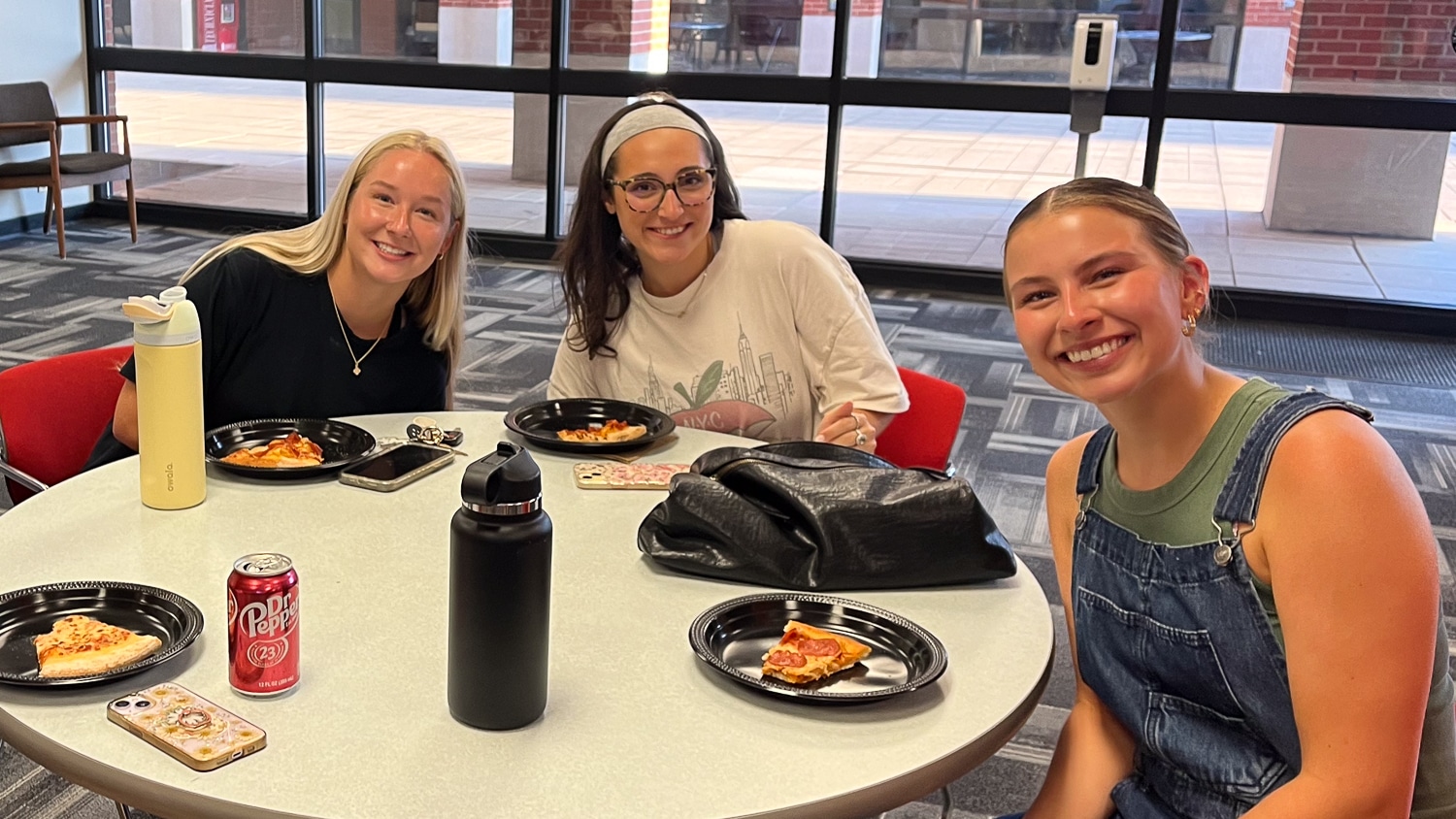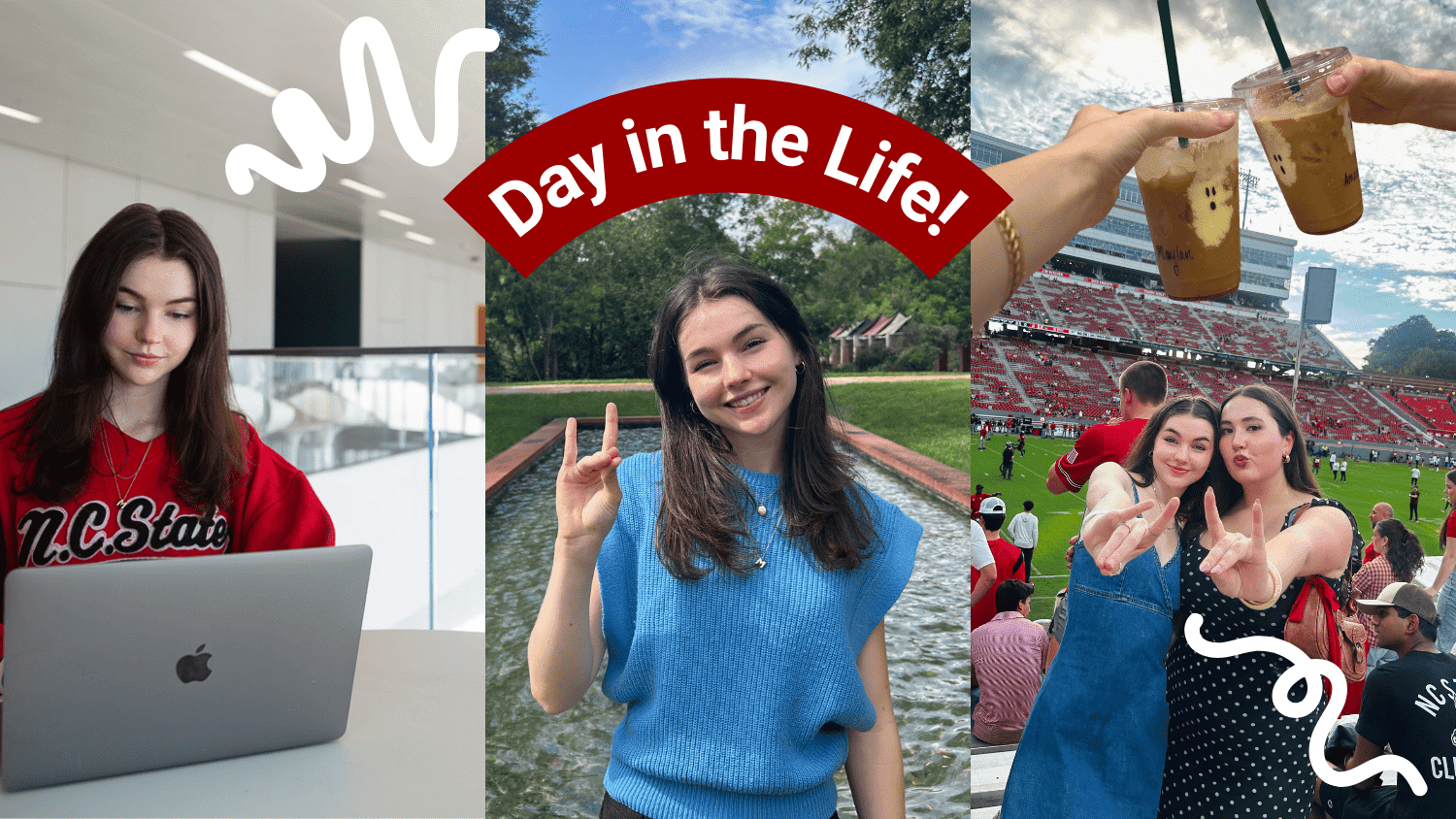Design Day

By Cameron Walker
Seniors in the Textile Engineering and Textile Technology programs at the Wilson College of Textiles have an incredible opportunity each year through Senior Design. The two-semester capstone course is designed to allow students to work in small groups to solve an industry-relevant problem that calls on and reinforces all they have learned in their respective programs, while gaining real-world experience they can carry with them to the workforce or graduate school. Each year, 80 to 95 students participate in the program, averaging 20 to 25 teams. The culmination of the course is Design Day, when the teams present their research in a juried poster session at NC State.
Read on for more information about this year’s winning teams.
Sustainability/Efficiency

First Place: Nonwoven Flexible Packaging | Sponsored by Avery Dennison
Hailey Clark, Austin Conner and Will Reiber worked to create a nonwoven flexible packaging product for e-commerce apparel goods. The sponsoring company hopes to create a closed loop material system, so the team’s task was to make the product from Avery Dennison woven selvage waste. They shredded the waste material, which was then broken down into shoddy, a fibrous form. Next, they created a nonwoven web, which they laminated and then treated with a thermoplastic polyurethane film to protect against water and wear. The end result is recycled packaging that can withstand the rigors of a global supply chain.

Second Place: Low Microfiber Release | Sponsored by The North Face
The release of microfibers from clothing through washing and everyday wear is an emerging environmental problem. A team comprising Sam Covington, Caleb Gellert, William Mullinix and Phillip Parker set out to improve The North Face fleece jackets, manufacturing textile prototypes in search of a product that would limit microfiber release while keeping the wearer warm and dry.

Third Place: Dye House of the Future | Sponsored by Albahealth
Albahealth sponsored a multi-pronged project centered on the redesign of the company’s garment dyehouse. The team, consisting of Yair Alonzo, Kenneth Bradbury, Lia Gregor and Raquel Weis, tackled the three main components: dye machinery, material handling and Simio modeling. In the end, they made upgrade recommendations and suggestions for process improvements in order to decrease costs and energy usage and improve efficiency.
Product Design

First Place: Hospital Bedsheet Design | Sponsored by Lleel3a LLC
According to the Agency for Healthcare Research and Quality, nearly 2.5 million people are affected by pressure ulcers, and more than 60,000 patients in the United States die annually as a result of these ulcers. However, the repositioning and turning needed to protect patients from ulcers frequently results in caregiver musculoskeletal injury. Project sponsor Lleel3a is developing a double sheet system for hospital beds to allow easy, automated turning of patients to reduce this lifting strain on nurses and other caregivers; they tasked team members Emma Dimig, Hannah Eberenz, Samantha Sharp and Eric Graham with the goal of adding textile design into the double-sheet system to minimize patient risk for pressure ulcers.
The team worked with local hospitals to learn more about pressure ulcers, hospital beds and nurse injury prevention. Their project culminated in the redesign of hospital bed sheet fabric — made of REPREVE polyester and Nylon — to be more compatible with the human body, accounting for moisture, the shearing of skin and patient support while turning, as well as an improved lifting mechanism.

Second Place: Warp Knitting for Medical Devices | Sponsored by Cortland
Atrial Septal Defect is a congenital heart defect in which babies are born with a hole in the wall that separates the two atria of the heart. Due to the risk of serious complications, surgeons plug the hole with a device called a septal occluder. Team members Moriah Kimel, Justin Wang and another student discovered that the only two FDA-approved septal occluders do not utilize smart textiles for tissue ingrowth, and decided to focus their project on incorporating warp knitting into the septal occluder medical device.
They tested four different knit structures with varying properties for criteria including burst strength, pore size and elastic modulus compared to the surrounding tissue of the heart. They chose the best knit structure and worked on a promising device design incorporating nitinol wire and a braid jacket.
This team is also the recipient of the John and Chris Calvert Innovation Award.

Third Place: Wingsuit Fabric Design | Sponsored by Red Bull
Humans can’t fly on their own yet, but they can come close through sports like BASE jumping — with the help of a wingsuit. This lightweight garment increases a body’s surface area and enables the wearer to extend their jump. Early models were constructed of canvas, wood, silk, steel and bone; the current iteration uses a more modern fabric — 210d nylon plain weave — but the material hasn’t been updated in a decade.
Team members Rebekah Cope, Hannah Joyner, Kyrsten Rudock and Ila Schauss set out to create a better wingsuit, developing a fabric with a smoother surface and increased stability, and improving the zippers. In the process, they constructed a wind tunnel and developed an air permeability test method. The team hopes their research will help athletes develop new tricks, fly in new locations and break speed records.
The Senior Design program at NC State’s Wilson College of Textiles is directed by Russell Gorga, professor in the Department of Textile Engineering, Chemistry and Science (TECS) and Jesse Jur, TECS associate professor.
Learn more about the TE/TT Senior Design Program
Follow the Wilson College of Textiles:
Twitter: @NCStateWilson
Instagram: @NCStateWilson
Linkedin.com/company/nc-state-wilson-college-of-textiles/
Facebook.com/NCStateWilsonTextiles/
Written by Cameron Walker
- Categories:


